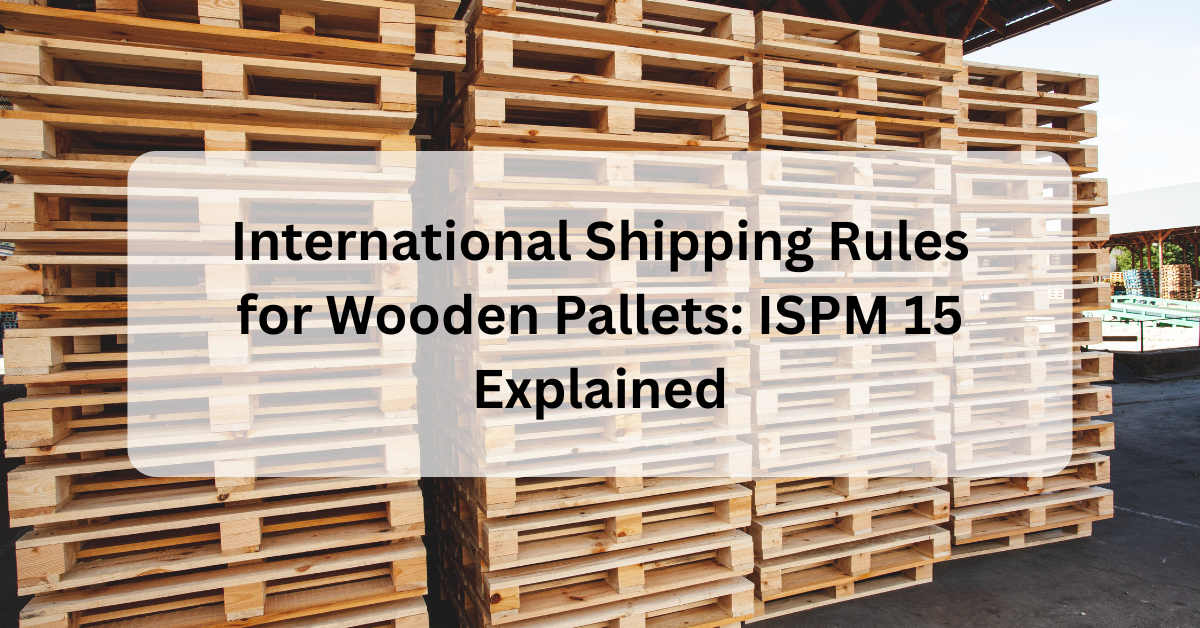Wooden pallets play a crucial role in protecting and transporting goods safely across borders. However, many businesses in Singapore may not realise that using untreated or non-compliant wooden pallets can result in serious consequences—such as customs delays, product rejections, and even penalties. To prevent these issues, exporters must comply with ISPM 15, the global standard for wooden packaging materials.
In this article, we’ll explain what ISPM 15 is, why it matters, and how Kai Beng helps Singapore businesses stay compliant with international shipping requirements.
What is ISPM 15?
ISPM 15 (International Standards for Phytosanitary Measures No. 15) is a regulation developed by the International Plant Protection Convention (IPPC). Its purpose is to prevent the spread of pests and diseases through wooden packaging materials like pallets, crates, and dunnage.
Under ISPM 15, all wooden pallets used in international shipping must undergo approved treatment processes, such as:
- Heat treatment (HT): Wood is heated to a minimum core temperature of 56°C for at least 30 minutes.
- Methyl bromide fumigation (MB): A pest control method, though less commonly used today due to environmental concerns.
Once treated, the wooden pallet is marked with the official IPPC stamp, proving it meets ISPM 15 standards and is safe for export.
Why ISPM 15 Matters for Singapore Exporters
Singapore is a major logistics and trade hub. With goods constantly moving in and out of the country, compliance with ISPM 15 is not optional—it’s essential. Here’s why:
- Avoid Customs Delays and Fines
Non-compliant wooden pallets can be rejected at foreign ports, leading to costly delays, product recalls, or even destruction of goods. - Protect Against Pest Spread
Untreated wooden pallets can carry invasive pests like the Asian longhorn beetle or pinewood nematode, which can damage ecosystems abroad. - Maintain International Trade Relationships
Complying with ISPM 15 reassures overseas partners that your goods meet global safety and sustainability standards.
For more details, you can refer to NParks Singapore’s official plant health guidelines, which highlight import and export requirements related to wooden materials.
Compliance Tips for Exporters in Singapore
To ensure your shipments face no issues overseas, follow these best practices:
✅ Source from certified suppliers: Always purchase wooden pallets from licensed manufacturers who are authorised to provide ISPM 15-compliant materials.
✅ Check for the IPPC mark: Before exporting, inspect your pallets for the international ISPM 15 stamp—it should include the treatment code (HT or MB) and country code.
✅ Train your logistics team: Ensure your warehouse and supply chain staff are aware of ISPM 15 requirements and can identify compliant pallets.
✅ Plan ahead for special shipments: Some countries have stricter requirements, so work with a reliable supplier who understands global standards.
How Kai Beng Ensures Compliance with ISPM 15
At Kai Beng Wooden Cases Manufacturer, we specialise in providing ISPM 15-certified wooden pallets and crates for businesses across Singapore. Here’s how we guarantee compliance:
- Certified Treatments: All our wooden pallets undergo heat treatment according to ISPM 15 standards.
- Official Marking: We apply the IPPC stamp to certify pallets are ready for international use.
- Sustainable Practices: Beyond compliance, we adopt eco-friendly processes, such as sourcing responsibly harvested timber and offering recycling solutions.
- Expert Guidance: Our team works closely with clients to ensure every shipment meets the unique requirements of their export destinations.
By partnering with Kai Beng, Singapore exporters gain peace of mind knowing their goods will move smoothly through international checkpoints without risk of rejection.
Beyond Compliance: The Future of Wooden Pallets in Shipping
While ISPM 15 is primarily about phytosanitary safety, many businesses today are also focused on sustainability. Wooden pallets, when sourced and treated responsibly, remain one of the most eco-friendly packaging solutions.
At Kai Beng, we continue to innovate with:
- Recycling programs to extend pallet lifespan.
- Upcycling solutions for businesses looking to repurpose pallets into storage, furniture, or creative projects.
- Custom-built designs that balance compliance, durability, and environmental responsibility.
Conclusion
For Singapore exporters, understanding and complying with ISPM 15 rules for wooden pallets is not just a regulatory requirement—it’s a business necessity. From avoiding costly customs delays to safeguarding trade relationships, the benefits of compliance far outweigh the risks of non-compliance.
With decades of expertise in wooden packaging solutions, Kai Beng ensures that every wooden pallet and crate we supply meets international standards, helping businesses ship with confidence.
Whether you’re a small exporter or a multinational corporation, trust Kai Beng to provide ISPM 15-certified wooden pallets that keep your goods safe, sustainable, and globally compliant.
